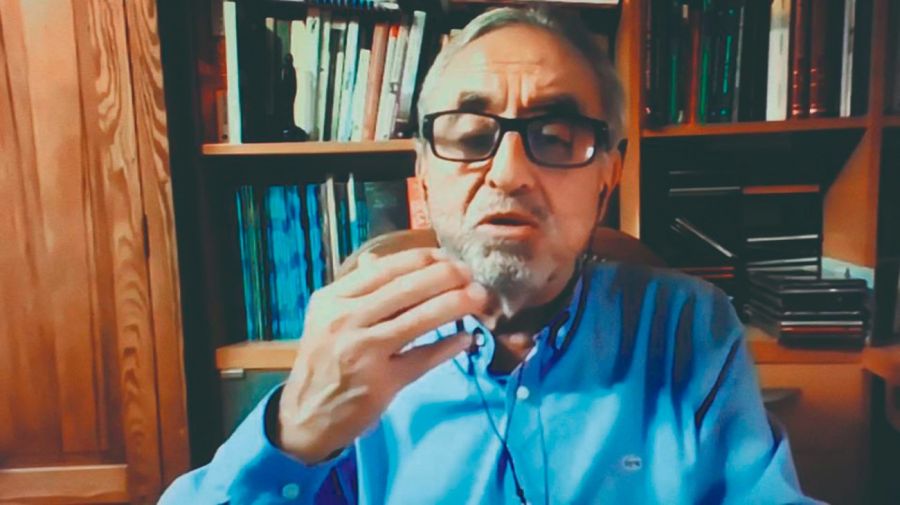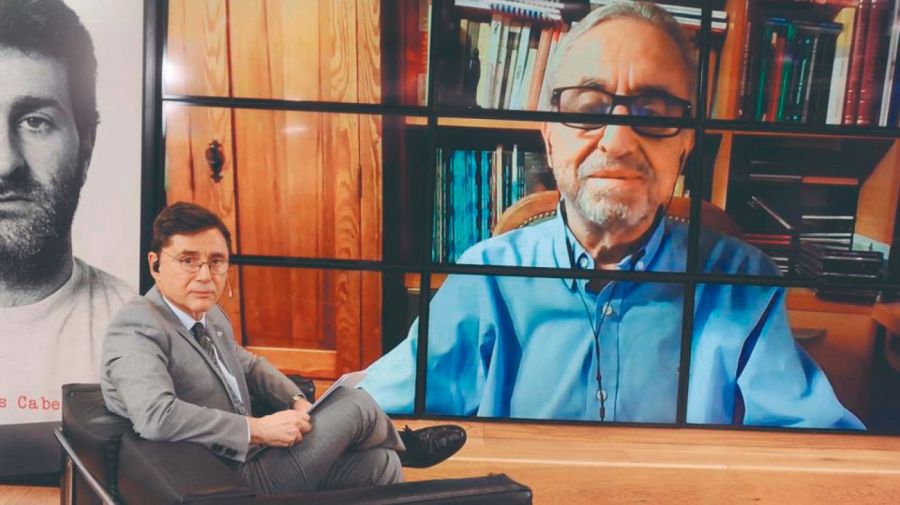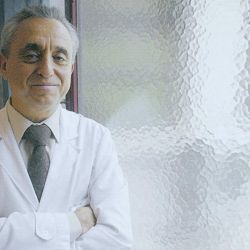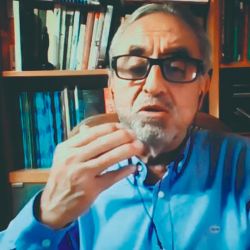An expert in infectious diseases, Dr Pedro Cahn chose this specialty as the most social branch of medicine. Over the years he has become one of the world’s main specialists in HIV/AIDS and during the Covid-19 pandemic, he has been a leading advisor to President Alberto Fernández. He says that the one thing he learned from 2020 is that very long quarantines are impossible, but he does not rule out a return to short and specific lockdowns.
The book Lo viral by the Spanish writer Jorge Carrión begins thus: “In the morning of November 17, 2019 an unknown virus entered the body of an unknown man aged 55. That afternoon the 21st century began.” Did a new stage begin for the world in Wuhan?
I think so, there’s a before and after for the pandemic. There are many things we still don’t realise because we’re rowing in the middle of a very choppy river. We’re not coming out of this pandemic the same way we entered, by which I’m not saying we’ll necessarily be better. Looking at the past century with two world wars, genocides against the Armenian and Jewish peoples, atomic bombs and other multiple atrocities, you only have to read the newspapers of the last 10 years [to see that].. This pandemic should allow us to reflect on some things to which we should not roll back. It is quite clear that neither individuals nor countries can think of facing the pandemic alone.There should be greater fraternity between countries to resolve this question, which is not what we saw last year with the ruthless scramble for personal protection equipment nor what we are seeing now with vaccines. Some countries have signed contracts which they have yet to receive while others have contracted vaccines for nine times their population. We have an entire continent like Africa receiving minimal doses. This all reminds me of the AIDS epidemic when the only thing really new was the virus with the same discrimination as today towards people with Covid-19 and health workers [who in some apartnment buildings were told to use the stairs, not the lift].
What about the after-effects? Thus City Mayor Horacio Rodríguez Larreta was recently hospitalised with arrhythmia.
I’d have to see his clinical history, maybe, maybe not, I cannot say. Sequence is not the same thing as cause and effect, it could be a coincidence, especially with somebody of the mayor’s age. The vast majority of patients do not have post-Covid arrhythmia.
If the focus of the 20th century was youth rights, the 21st has created the right to longevity. What would have happened with a virus like this 50 years ago when there were not even artificial respirators?
I think it would have been much worse. Even at the start of this century we could not have had this interview because there was no Zoom nor would any discussion as to vaccines be possible within a year of the first case. Within the tremendous misfortune of this pandemic, we’re lucky that it happened in a period with such a broad level of scientific and technological development.
As for the elderly, we hear voices like Texas Lieutenant-Governor Dan Patrick affirming that the old must die to make room for the young, a kind of planned genocide for the elderly. We have yet to be in the situation of having to select who gets the respirator and who not and I hope that moment never arrives. Elements which are not just scientific and technical but bioethical enter into the questions there. Those are the situations we must avoid.
When I interviewed Fernando Savater, he recalled that in the late 1950s there was an Asian flu which killed 1.5 million people across Asia, Europe and the Americas, which would be more or less the same percentage of the then world population as Covid-19 will supposedly end up finishing off. Could it be that there was not the same global impact in those times because a lower longevity was acceptable?
—This pandemic has moved so fast, the fruit of communications. The first news from the Chinese city of Wuhan came on December 27, 2019. We found out right at the start of 2020 because on New Year’s Eve China informed the World Health Organisation (WHO). We saw it as a Chinese phenomenon but then it was not just China but also Iran, other Asian countries and soon enough Europe. Then we realised that it could happen to us, as it very soon did – Argentina’s first case was reported on March 3, 2020. Nor will it be over when we are all vaccinated because no vaccine is 100 percent effective. Many of the people reading this interview will surely be already vaccinated but that does not mean that they are protected forever or that they should stop taking the usual precautions (face-masks, etc.) We must also bear in mind that the virus can have mutations which make it more aggressive or contagious – just look at what is happening on the other side of the border in Brazil with the pandemic out of control.

Measuring by deaths per million people, many South American countries (Argentina, Bolivia, Brazil, Chile, Colombia and Peru) are in the 1,000-1,400 range while smaller countries like Uruguay and Paraguay are better off. Does this correlation have any scientific explanation?
I can only vouch for Argentina’s data since I know how our SISA [Sistema Integrado de Información Sanitaria Argentino] works. I have no doubt that Chile and Uruguay have serious reporting systems but bearing in mind how the pandemic is being handled in Brazil, I have my doubts about their figures. Brazil has been very messy with four changes of health minister in the course of the pandemic. There are different circumstances. Chile has tried to keep its commercial activities going but with nocturnal curfews in several months and now quarantines in Greater Santiago. All last year Uruguay relied on the responsibility of its citizens but has had to close down schools and minimise activities in public offices. We have had to resort to such measures and I hope we do not have to do so again but if things get out of hand, lockdowns may be necessary.
One of the many things we have learned in 2021 from what we did in 2020 is that we should probably be more surgical about the lockdowns. We might need to shut down Tucumán rather than Buenos Aires, or vice versa, one neighbourhood in Córdoba rather than the entire city. In activities generating wealth like industry and commerce, the protocols generally work very well. Shops and supermarkets generally limit the number of people, often taking the temperature of customers and applying hand sanitiser gel with alcohol. The big problems are informal activities and social meetings. In the first stage of the pandemic there was a lot of contagion among health workers, not because of the Covid-19 patients but because they would take their well-deserved breaks, several of them together in poorly ventilated rooms, often sharing a mate gourd. Industries and factories also took care but again during breaks and after-hours the workers would get together, shedding their face-masks and forgetting about social distancing. So as the weather starts to keep us inside, we must focus on the informal activities, avoiding social meetings in badly ventilated places. Open-air activities are always an advantage but even then 50 to 100 people without face-masks is no guarantee either. Being in a closed place in autumn or winter with many people is a recipe for disaster.
Chile has ordered the confinement of almost 70 percent of its population despite the success of its vaccination campaign. Will the same happen this autumn and winter in Argentina even with vaccinations on the rise?
We cannot say that Chile’s vaccination campaign failed. If it reached a lot of people, you have to see how much time one dose takes and how much two doses. The effect is not immediate. It’s not just a question of getting vaccinated and being immunised – at least three weeks are required to develop antibodies from a single dose. Then comes a second dose 2 to 28 days later requiring a further two or three weeks. That’s practically two months. Chile is vaccinating fundamentally with a vaccine called CoronaVac from the Sinovac lab, which is around 50 percent effective. I don’t say that negatively, 50 percent is a whole lot better than zero but it’s not like being 70, 80 or 90 percent effective like other vaccines. Chile saw itself as obliged to impose quarantines because the number of cases was growing to a degree which was beginning to compromise the possibility of attending to hospitalised patients. We have to give them a further couple of weeks for their vaccination plan. One thing should not stand in the way of the other. We will vaccinate as many people as we can but taking care not to saturate the system.
In Argentina, Chile’s vaccination rate is praised without mentioning that their vaccine has yet to clear the third phase, unlike Sputnik V. What balance do you draw of the political use of the arguments in favour of and against vaccines?
If Chile vaccinates with Sinovac, it’s because they have the necessary technical information. Their regulatory agency is very serious but so is ours with Sputnik or now Sinopharm. The report in a scientific journal is the final step. How do we know the percentage for measuring how effective a vaccine is? You do a double blind test using placebos. Giving an example from one of these studies, out of 38,000 test participants there were 176 confirmed cases of Covid-19, of which 160 came from the placebo side and only 16 from the vaccine but 100 percent of the serious cases came from the placebo side. The vaccines basically reduce the need for oxygen, hospitalisation, intensive care and the death rate. As for the political use, it’s a disgrace. We are in an election year and [vaccines] should stay completely out [of the campaign]. The government buys vaccines because it is a state obligation and the opposition should support it. You can discuss daily political and economic situations – there are multiple issues, inflation, crime, you take your pick – but vaccines should be beyond any discussion.
What’s the state of play in Argentina regarding research into the Chinese vaccine CanSino Biologics?
Our group at Fundación Huésped has participated in three vaccine protocols – Johnson & Johnson’s Janssen (which is undergoing approval in the United States and hopefully here too), Sinopharm (a state-to-state purchase already registered by a national lab which will be its representative) and CanSino (which I understand to have received authorisation for emergency use in our country). We have participated in the form of coordinating 12 centres in both the City and Province of Buenos Aires, recruiting around 3,700 patients. This vaccine is very well tolerated and we have not attributed any adverse effects to it. I cannot yet say how effective the local studies have been but globally it is around 67 percent effective against transmission and over 90 percent in the prevention of serious disease. Sinopharm and Janssen both have similar data. Janssen and CanSino are single-dose vaccines. All the others – Pfizer, Moderna, Sputnik, AstraZeneca, etc. – are double dose although the possibility is being considered of extending the first dose and postponing the second, as has been done in Britain.
Argentina has purchased 65 million doses thus leaving part of a population of 45 million uncovered if two doses are required. Chile, with less than half Argentina’s population, purchased 88 million doses, which would permit it to vaccinate its population twice over, even with two doses. Were there delays or glitches in the purchases of vaccines?
If we’re talking about 65 million doses, even if they were all double, we’d be talking about 32 million people vaccinated, which implies approximately 80 percent of the population. That’s not a bad calculation. Moreover, signing contracts does not mean much. Canada bought nine times as many vaccines as its population but has not even received 10 percent of that. Australia, a country often taken as a model, could not vaccinate in proportion to its contracts because it depended on AstraZeneca vaccines then in the final stages of being processed in Italy but the European Union banned exports beyond the EU. If we received everything we purchased under contract, the situation would be completely different. It does not make me nervous if Chile vaccinates a lot. I hope Chile and Brazil vaccinate a lot and Uruguay, Paraguay and Bolivia too. The safer our frontiers, the safer we will be.
Does Canada having bought 314 million doses for 38 million inhabitants imply some international failure from an ethical standpoint?
It hurts the human conscience without any doubt. It hurts mine. Let us imagine that production is unblocked and Canada receives those millions of doses while the African continent goes without. There would be freezers bulging with vaccines in Montreal, Toronto and Vancouver with other people dying because they could not be vaccinated. Does that seem reasonable?
To the ethical question could be added a basic question of intelligence.
A US secretary of state in the 1990s presented a report to his president telling him that the main danger facing the US in that decade was not terrorism nor the Soviet Union but AIDS, just like you say. Those who do not do it out of solidarity should do it out of egoísm. All countries should have access to the vaccines. It makes no sense to keep them in the freezer while other people are dying – sooner or later that boomerangs.

What will happen with the AstraZeneca vaccine? Will it arrive fast in Argentina? What is your prognosis regarding its efficacy?
The efficacy of a vaccine is not a question of my prognosis but the published data. AstraZeneca has presented its data to the Food & Drug Administration in the US, a very serious body. It is 72 percent effective while offering around 90 percent protection against serious illness with higher percentages for the elderly. When we say that there are problems producing vaccines, it’s not just the production of antigens. AstraZeneca is the best example. An Argentine lab, mAbxience, produces it, sending the equivalent of 36 million doses to Mexico for the final packaging but inputs are lacking. I don’t know exactly what’s missing, whether the bottle, the top or the syringe, all inputs subject to a ruthless race between different countries trying to buy everything they can.
Have you been vaccinated?
Yes.
What did you feel about what is known here as “vacunagate”?
Huge disgust. Any person who skips the queue to be vaccinated is doing a bad thing. It had the worst possible ending because it cost one of the best health ministers in our history, Ginés González García, his post. It doesn’t change my opinion of him but Ginés made a mistake and paid the price. The decision to replace him was right in order to send a strong message to society even though when you take a look at that list of 70 people vaccinated, over half were justified. But even if only one were out of line, it should not have happened. The order of vaccination has to be established according to technical criteria.
Did you speak with the ex-minister once he left office?
My relationship with Ginés was not one of friendship but of mutual respect. I’ve known him since 1989 when he formed part of the AIDS Technical Advisory Committee when it was created and more recently in the meetings when summoned by the president although sometimes Carla Vizzotti. In answer to your question, I’d like to let a little more time go by because I imagine that he must be very hurt but I’d like to greet him at some point.
Do you see any ethical reprimand for those who decide to go for vaccination in the US?
No, if anybody has the money and sufficient time to comply with quarantine at both ends and is vaccinated outside the country, that is one less vaccine we have to apply. I have no reproach. If you ask me whether I would do it, the answer is no.
Faced with a second wave, will the strategy be more specific, partial and shorter quarantines?
That’s my opinion but it’s not necessarily going to be the decision taken by the government. The advisory committee is overrated – we’re just advisors. Nobody voted for us, we do not represent anybody other than ourselves. The decisions are taken by the president, his ministers and the provincial governors. I have many anecdotes about people approaching me and asking me to open a tennis court or a shop. I just transmit my opinion, right or wrong. I believe that at some point some restrictions may be necessary. Supposing that in an ideal scenario it were possible, as we know it isn’t, to lock down all activity for a fortnight. That would mean 15 days of everybody staying at home, including doctors, the police, firefighters, food providers, etc. That could not work but if it did, the pandemic would fizzle out because there would be nobody to infect. But evidently impossible. We must try and maintain all activities linked to the welfare of the people because it’s all about economic recovery but at the same time trying to avoid those activities contributing to the perpetuation of the pandemic. A short 10-day lockdown seems to be sufficient from what we have seen. But it’s a very dynamic thing requiring permanent observation. There are epidemiological indicators helping us to realise where we are placed.
In hindsight, should shorter and less drastic and permanent measures have been taken?
Things could probably have been done differently. The point was when and how that decision was taken. The fundamental objective of last year’s quarantine was to prepare the health system. We can be proud that no Argentine died for lack of an oxygen tube or lack of access to an intensive care bed. More hospitals were built, wards reconditioned and more intensive care beds supplied. That will not happen again this year. More hospitals could be built but the point is we do not have the people to staff them – we cannot multiply therapists. I do not see the need for restrictive measures in the immediate term.
What is the therapeutic role at the moment of treatments like plasma, equine serum or inhaled analgesics?
The only medicine beyond discussion worldwide is dexamethasone, a corticosteroid applied to people requiring oxygen definitely lowers mortality. There are contradictory data regarding the plasma of convalescents. I co-authored a work on equine serum published recently, showing some favourable numbers for intensive care but not demonstrating its use to be clearly superior to not using it. There is no study with any scientific rigour showing inhaled ibuprofen to be useful. Monoclonal antibodies show promising results. Meanwhile a great deal of medicines are being researched – antiviral drugs, immune response modifiers. Paradoxically, we are more behind with the therapy than with the vaccines.
Is the most terrifying dystopia of the virus evolving resistance to vaccines and returning to the situation of 2019 feasible?
I don’t think that will happen. Every year we are vaccinated against influenza and if you get your flu jab this year, it won’t be with a strain from 2019 or 2020. The worst scenario is indeed needing new vaccines every year. The world is so developed in scientific and technical terms that it permits us to view that situation with relative optimism. At this moment vaccines are being researched for new strains. From Pfizer downwards, every lab is working on trying out vaccines against the English, South African and Brazilian variants and those to come (which we cannot rule out). The virus is cunning but I believe that the scientists working on this are more cunning.
Would other pandemics be unimaginable?
I wouldn’t say unfounded, not impossible but I see it as improbable that every few years we have a situation like this. Covid-19 is a disease of respiratory transmission. If I had Covid and we were speaking side by side without face-masks, I could infect you during this interview. That does not happen with other very severe illnesses like Ebola, which is why there was no worldwide epidemic for the latter. It depends on the mechanism of transmission and the movement of people. In our culture nothing happening anywhere in the world can be alien to us.
Why is there still no vaccine against AIDS?
That’s a different situation. Vaccines stimulate the immunological system but with AIDS it is the immune system which is under attack. That’s one of the reasons why it is so difficult to come up with a vaccine. The AIDS virus has an extraordinary capacity to mutate. Will we find something? I hope so.
Did you have any intuition that there was going to be a major public health problem when you decided to dedicate yourself to infectology?
I would be lying if I said I was capable of forecasting the AIDS and Covid-19 pandemics. I chose to specialise in infectology because it is very linked to the social and the only specialty where you fight living enemies – bacteria, parasites, a virus or fungi which also have the capacity to adapt (as can be seen from their growing resistance to antibiotics). Poverty and epidemics feed each other.
You were a member of the Communist Party. How would you define yourself ideologically?
I dropped out of the Communist Party a long time ago, in 1987 or 1988, because I disagreed with many things. I saw that the ideals which led me to join were not matched by reality. Today I would say I was a progressive but I do not belong to any party. I’ve seldom voted for the winner, often for a loser. That’s part of the rules of democracy.
* – This interview was originally conducted for Spanish and has been translated and edited for clarity and length.


























Comments